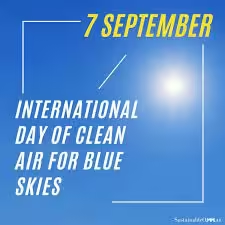Table of Contents
The International Day of Clean Air for Blue Skies 2024, observed annually on September 7, was established by the United Nations General Assembly in 2019. This day serves as a global reminder of the critical need to address air pollution and its impacts on health, climate, and the environment.
Air pollution has been a persistent issue throughout history, but it has gained heightened recognition in recent decades due to its severe impact on human health and the environment. The establishment of the International Day of Clean Air for Blue Skies underscores the urgency of addressing air quality issues, which are a significant global concern.
The State of Air Quality in 2024
As of 2024, air quality remains a pressing issue in many parts of the world. The World Health Organization (WHO) and other environmental agencies continuously monitor and report on air quality, highlighting both improvements and deteriorations in different regions.
Recent data shows a mixed picture. In some countries, significant strides have been made in reducing air pollution levels through stringent regulations and the promotion of cleaner technologies. For instance, several European nations have made considerable progress in reducing particulate matter (PM) and nitrogen dioxide (NO2) levels through policies that promote renewable energy, enhance public transportation, and implement stricter emission standards.
Economic and Environmental Implications
The economic implications of air pollution are substantial. The cost of healthcare related to air pollution, loss of productivity due to illness, and damage to ecosystems and infrastructure all contribute to the economic burden. For example, studies have shown that air pollution can lead to significant economic losses due to healthcare costs and reduced labor productivity.
From an environmental perspective, air pollution has far-reaching effects. Pollutants can damage ecosystems, harm wildlife, and contribute to climate change. For instance, pollutants like ground-level ozone and particulate matter can affect crop yields and forest health. Additionally, some air pollutants, such as black carbon, contribute to global warming by absorbing sunlight and altering atmospheric processes.
Global and Local Efforts to Improve Air Quality
Efforts to improve air quality are being made at both global and local levels. International agreements and frameworks play a crucial role in setting standards and fostering cooperation among nations. The Paris Agreement, for instance, aims to limit global warming and reduce greenhouse gas emissions, which in turn can help address air pollution.
Many countries have established air quality standards and regulations to control emissions from industrial sources, vehicles, and other contributors to air pollution. For example, the introduction of stricter emission standards for vehicles and industrial processes has led to reductions in pollutants like NO2 and PM2.5.
Advances in technology are contributing to cleaner air. Innovations such as electric vehicles, renewable energy sources, and air filtration systems are helping to reduce emissions and improve air quality.
The Importance of Continued Advocacy and Action
The International Day of Clean Air for Blue Skies 2024 serves as an important reminder of the need for continued advocacy and action to address air pollution. It is a day to reflect on the progress made, acknowledge the challenges that remain, and recommit to efforts aimed at improving air quality.
Advocacy efforts are crucial in driving policy changes and ensuring that air quality remains a priority on national and global agendas. Engaging with policymakers, participating in environmental organizations, and supporting research and innovation are all ways in which individuals and communities can contribute to cleaner air.
Impact of Air Pollution on Health
The health impacts of air pollution are well-documented and continue to be a major public health issue. Exposure to polluted air has been linked to a range of health problems, including respiratory diseases, cardiovascular conditions, and premature death. The WHO estimates that air pollution is responsible for millions of premature deaths each year, with the most vulnerable populations—such as children, the elderly, and those with pre-existing health conditions—being disproportionately affected.
Air pollution affects both outdoor and indoor environments. Outdoor air pollution includes pollutants such as particulate matter (PM2.5 and PM10), nitrogen dioxide (NO2), sulfur dioxide (SO2), and ozone (O3). These pollutants can penetrate deep into the respiratory system and cause or exacerbate conditions like asthma, chronic bronchitis, and lung cancer.
As we mark the International Day of Clean Air for Blue Skies in 2024, it is essential to recognize the strides made in improving air quality while also acknowledging the work that remains. Air pollution remains a significant challenge with far-reaching health, economic, and environmental impacts.
- why Taliban say I love Hindustan - September 19, 2024
- International Day of Peace 2024 - September 18, 2024
- International Equal Pay Day 2024 - September 17, 2024

